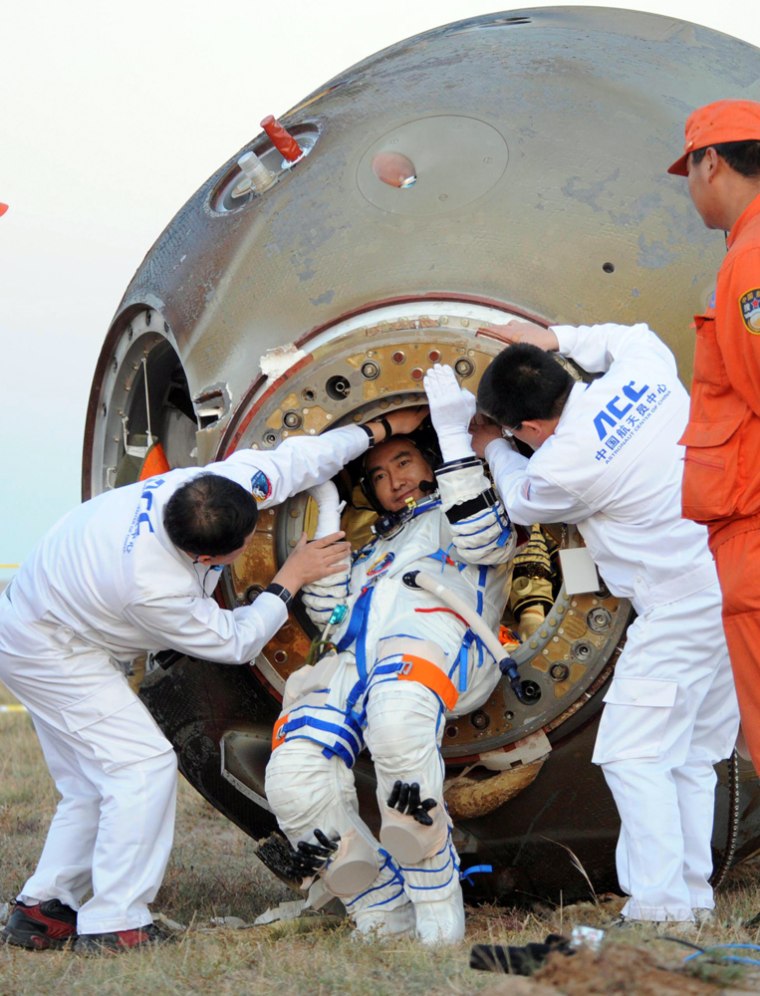Three Chinese astronauts made a jubilant return to Earth on Sunday after successfully completing the country's first-ever spacewalk, an event the premier said was "a stride forward" in China's space history.
The spacewalk was mainly aimed at testing China's mastery of the technology involved. The sole task of mission commander Zhai Zhigang was to retrieve an experimental rack attached to the outside of the orbital module. He remained outside for about 13 minutes.
"It was a glorious mission, full of challenges with a successful end," Zhai said after the Shenzhou 7 module landed under clear skies in the grasslands of China's northern Inner Mongolia region. "We feel proud of the motherland."
State broadcaster CCTV showed the astronauts emerge from their capsule, which floated gently down under a giant red-and-white-striped parachute, and wave at cameras as they celebrated the end of their 68-hour mission.
Zhai, Liu Boming and Jing Haipeng stayed inside for about 46 minutes to adapt to Earth's gravity before crawling out of the narrow entrance. They were declared healthy after medical examinations inside the module.
"This mission's success is a milestone; a stride forward," Premier Wen Jiabao said at mission control.
‘Big step’ for national pride
Saturday's spacewalk, which was broadcast live and watched by crowds gathered around outdoor television screens, further stoked national pride one month after the close of the Beijing Olympics.
"A small step by Zhai Zhigang in space is a big step in the history of the Chinese nation," said a commentary by the official Xinhua News Agency carried Sunday by the Beijing Daily newspaper.
Most newspapers published front-page pictures of Zhai clutching a Chinese flag as he hovered in space outside the Shenzhou 7 vessel, alongside photos of Chinese President Hu Jintao on a telephone as he spoke to the astronauts.
While successful, the spacewalk wasn't without anxious moments.
Zhai, a 41-year-old fighter pilot, appeared to struggle with the hatch and a fire alarm was triggered in the orbiter as he began the spacewalk.
Wang Zhaoyao, deputy director of manned spaceflight, conceded that the combined effects of weightlessness and depressurization on the hatch opening operation hadn't been fully anticipated. He blamed a faulty sensor for the fire alarm.
The spacewalk required the astronauts to first depressurize and then repressurize the orbital module and proved the effectiveness of Zhai's Feitian spacesuit, produced by China at a cost of $4.4 million. Liu wore a nearly identical Russian-made Orlan suit, according to the reports.
The spacewalk paves the way for assembling a space station from two Shenzhou orbital modules, the next major goal of China's manned spaceflight program.
China is also pursuing lunar exploration and may attempt to land a man on the moon in the next decade — possibly ahead of NASA's 2020 target date for returning to the moon.
China launched its first manned mission, Shenzhou 5, in 2003, becoming only the third country after Russia and the United States to launch a man into space. That was followed by a two-man mission in 2005.
Along with challenging Russia and the U.S., the spacewalk ups the ante in China's competition with aspiring Asian space powers Japan and India. China's advances have spurred investment in their own programs, partly for bragging rights but also in search of economic benefits such as grabbing a bigger slice of the commercial satellite launching business.
China plans to mass-produce the next version of the Shenzhou ship to service its future space station and says it may make such missions available to other countries.
